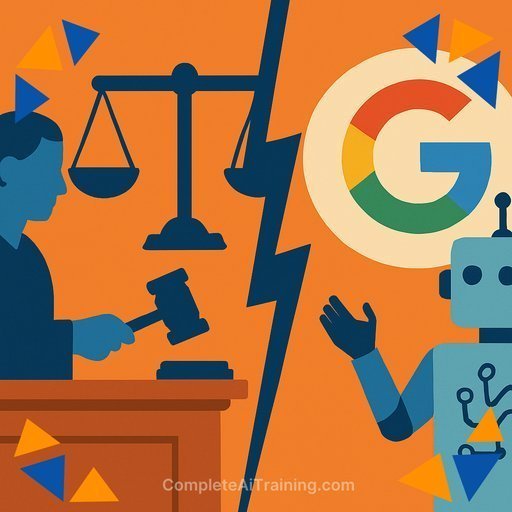AI Lawsuit Against Alphabet Signals a Broader Legal Shift
AI training and output liability are moving from theory to courtroom practice. Media, entertainment, and authors are pressing claims that cut to the core of how large models are built and monetized. The new flashpoint: Penske Media's suit against Google and Alphabet over AI Overviews.
Penske Media v. Google/Alphabet: The Claim
Penske Media says Google is republishing its content through AI Overviews and using that content to train models without proper consent. The complaint argues Google is leveraging its search position to force a new deal: permit reuse in AI Overviews or risk less visibility in search.
PMC says summaries at the top of results suppress clicks and siphon value from original reporting. Google counters that AI Overviews make search more helpful, broaden referral traffic, and that it will defend against "meritless" claims.
Parallel Cases Shaping the Field
- NYT v. OpenAI/Microsoft (S.D.N.Y.). Filed December 2023. Motions to dismiss were largely denied; the case is in discovery. The Times alleges training and outputs used its works without permission.
- Disney/Universal v. Midjourney (C.D. Cal.). Plaintiffs say the image model was trained on massive libraries, including famous characters, without consent.
- Authors v. Anthropic (N.D. Cal.). Authors Andrea Bartz, Charles Graeber, and Kirk Wallace Johnson settled claims over use of their books to train Claude. Reported terms include $1.5B, subject to court approval.
Beyond Copyright: Expanding Theories of Liability
Early filings centered on copyright. More recent complaints add trademark dilution, false advertising, right of publicity, and unfair competition. These claims target both model developers and companies that deploy AI outputs in products and ads.
Fair Use Will Carry Much of the Weight
The scope of fair use for training and for outputs is the key issue. Expect close fights over market harm, transformativeness, and the nature and amount of copied material. See 17 U.S.C. § 107 for the statutory factors.
Unanswered Questions Courts Are Likely to Tackle
- Is training on copyrighted works fair use when the training set is large and the use is commercial?
- When do AI outputs cross into derivative works or substantial similarity with protected expression?
- How do robots.txt, rate limits, paywalls, and click-through terms affect consent to crawl, cache, or train?
- Can summary features that depress click-through be framed as unfair competition or a misuse of market power?
- What remedies are realistic: damages, injunctions, model changes, or algorithmic disgorgement?
What In-House and Outside Counsel Should Do Now
- For publishers and media: Update site terms; align robots.txt, paywall, and API policies; log crawler activity. Track AI summaries for misattribution or substitution effects. Preserve server logs and exemplars for damages models.
- For brands and marketers: Vet genAI outputs for trademark, false advertising, and publicity rights. Require vendor indemnities, training data disclosures, and content filters. Maintain review workflows and keep audit trails.
- For AI developers: Document data provenance and licensing; honor opt-outs. Limit and monitor memorization. Add source attribution where feasible. Implement output filters and claim-response playbooks.
- Contract basics: Tighten IP clauses, warranties, and indemnities. Address dataset licensing, usage caps, and model retraining rights. Consider insurance coverage for IP claims.
- Litigation readiness: Issue holds early. Map data flows, version models, and keep training snapshots. Prepare experts on market substitution and model behavior.
Regulatory Signals
Expect more guidance and inquiries from agencies and the U.S. Copyright Office as cases mature. Track agency updates here: U.S. Copyright Office: Artificial Intelligence.
Why Penske v. Alphabet Matters
If courts accept that AI summaries replace the need to click through, publishers may gain leverage on both licensing and remedies. If Google's position holds, search-integrated summaries could be treated as commentary or reference outputs that still drive net traffic. Either outcome will influence how training data is sourced and how summaries are deployed across platforms.
Bottom line: The fight is shifting from headlines to facts: traffic impact, model behavior, and the paper trail of consent. Build your record now.
Upskilling legal teams on AI? Browse practical programs by role: Complete AI Training - Courses by Job.
Your membership also unlocks:






